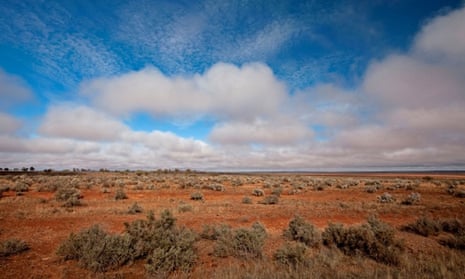A delegation of farmers has called for the Abbott government to act on climate change by restoring an emissions trading scheme, maintaining the current renewable energy target and spending on rail infrastructure to improve inland transport and reduce carbon emissions.
The farmers have spent two days lobbying the Coalition to start implementing a suite of policies to deal with the effects of climate change, warning of dire consequences for the agriculture sector if the threat was not addressed.
They have told the government MPs, including John Cobb and the staff of the treasurer Joe Hockey, that the Direct Action policy, which provides incentives for polluters to reduce carbon emissions, will not work to ameliorate climate change, “but if the government wants to give away money, people will keep taking it”.
The delegation said the lack of climate policies was being exacerbated by the cuts to research and development funding for applied climate science and the Bureau of Meteorology.
The visit came as intense negotiations between the government and Labor continued over the RET, which currently requires the government to source 41,000 gigawatt hours of energy from renewables by 2020. The latest government offer to Labor is 32,000GWh.
It also follows a report by University of Melbourne researchers called Appetite for Change, which charted the detrimental effects of climate change on Australia’s food production.
The farmers, organised by Earth Hour Australia, said the Abbott government needed to show leadership on the issue and it could start by using the term climate change, rather than “climate variability”.
John Pettigrew, who has an irrigation property at Bunbartha north of Shepperton, said calling climate change “variability” was “doing everyone a disservice”.
“We are not going to revert to where we were 10 years ago,” said Pettigrew. “There will be highs and lows, but the trend is there. We saw it through the millennium drought and failing to acknowledge the problem is only adding to it.
“It’s doing the industry a disservice. It’s about how the industry is perceived by overseas buyers. Already in dairy, large multinational companies are demanding environment and carbon emission recording to show it’s been factored in.
“The Australian government’s international perception is not good [on climate change] and that is an impediment to us being able to get into high-value markets.”
Peter Holding, who runs a 1500-hectare farm at Harden west of Canberra, said the science indicated that climate change was a bigger issue than the weather and Australia needed to protect its international reputation.
“We want to see some leadership, we are tired of platitudes and saying it can’t happen, we are losing markets because Australia’s reputation is slipping on being clean and green,” Holding said.
“Climate change going to have impacts right across the budget from dislocation of whole rural communities to drought assistance.
“We need infrastructure spending and new industries in the renewable energy sector. Governments have to start thinking on policies that last a bit longer than a three year term.”
Holding said while some carbon farming initiatives such as methane capture in piggeries were effective, Direct Action was generally rolling out slowly and farmers and researchers remain unconvinced the policy will meet any targets.
“People will be more than willing to accept the funding but we – and the research – are not convinced you can make a difference to climate change by doing it and therefore it is a waste of precious government funds, but if the government wants to give away money, people will keep taking it” said Holding.
Sid Plant, a grazier on the Darling Downs in Queensland, would like to see an emissions trading scheme, like the one first negotiated in 2009 by Kevin Rudd, Malcolm Turnbull and Ian Macfarlane.
Plant said he was hopeful that “something sensible” on emissions trading was proposed because he believes it would allow farmers to benefit from increasing organic carbon in the soil, which had added benefits for the farm as well as turning a profit.
“I hoped to position myself to have carbon to sell and it might not pay a lot but there will be benefits for increasing organic carbon, such as retaining more moisture,” he said.
Plant’s family has farmed for seven generations and he first had to study weather patterns to get his pilot’s licence. He first noticed the El Nino pattern in 1973 and learned to apply the science to better manage his cattle. Under a changing climate, Plant no longer keeps a breeding herd so that he can sell down as soon as the weather turns dry. He is convinced he will not see much rain from now until Christmas.
“The most significant part of climate change is declining rainfall, which applies to most of Queensland,” Plant said.
“Australian farmers are feeling climate change as early as anybody in the world, and significantly, we have the world’s highest year to year rainfall variability.
“Climate change is coming over the top and when the UN sees our farmers as leading the world, we seem to be running out of bright ideas without the right policies. I want to save world for my grandchildren.
“I find it very difficult to find someone to vote for.”

Comments (…)
Sign in or create your Guardian account to join the discussion